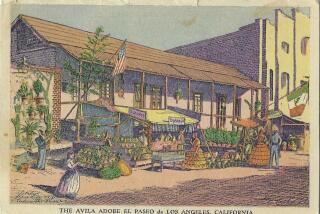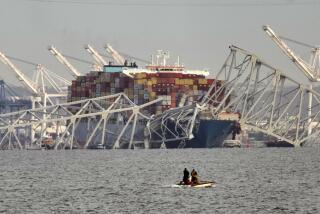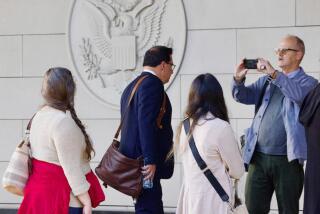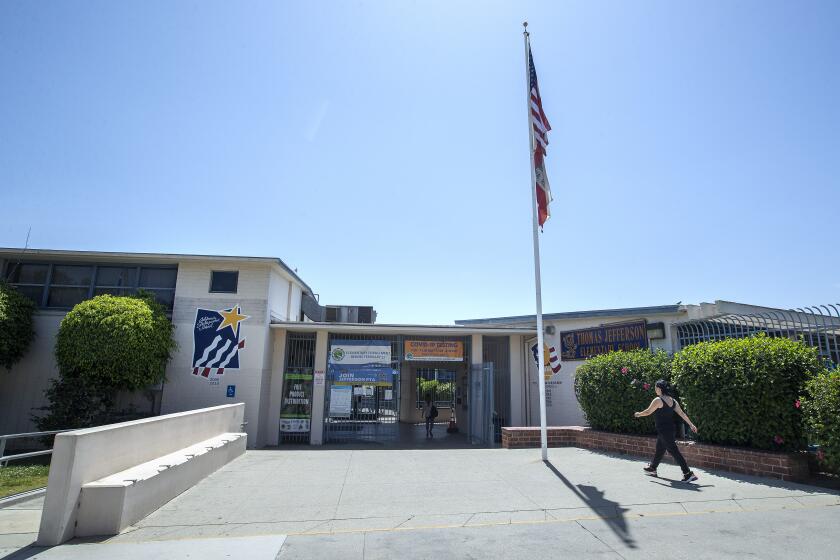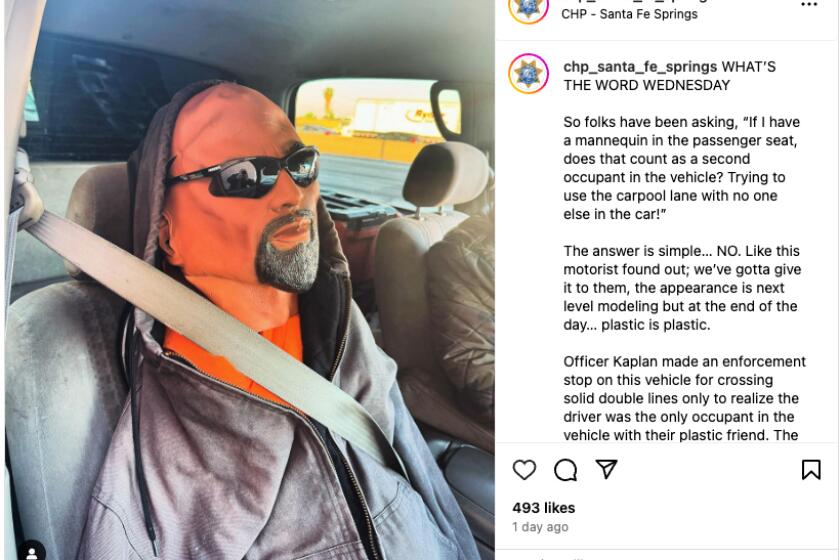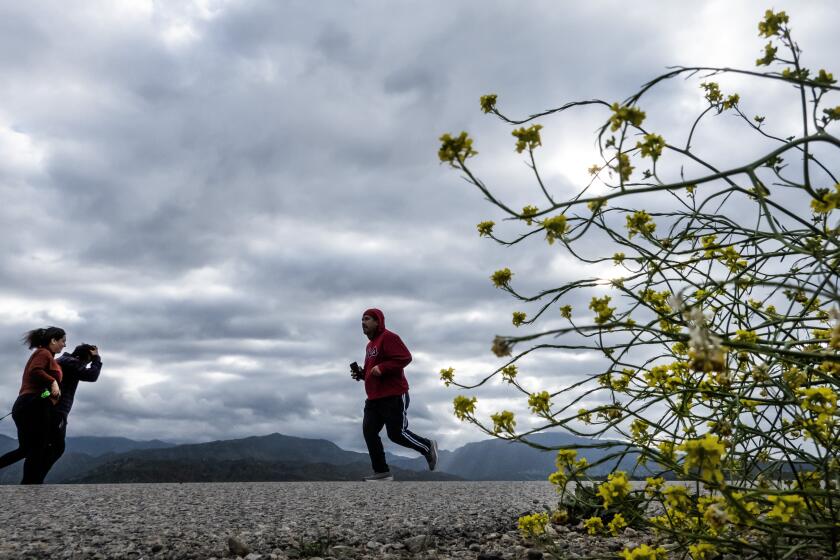In Mexicali, a haven for broken lives
Mario Ramos stirs a pot of beans with a bent spatula as the men crowd into the kitchen, the ragged line stretching out the splintered doorway.
Years ago, Ramos, 45, grilled up pricey seafood in a tiki-themed restaurant on Pacific Coast Highway in Laguna Beach. Now, he’s serving starchy meals on plastic plates. One of his busboys worked at the Shanghai Grill in Beverly Hills; another is a 28-year-old U.S. Marines veteran.
The diners, who remove their sweat-stained caps to accept the food with grateful nods, have been deported from the U.S. as recently as eight hours ago. They are penniless, unshaven. Some are barefoot.
PHOTOS: Hotel of the Deported Migrant
Mario Ramos has served thousands like them.
Some helped build Las Vegas subdivisions. There was a sushi chef from Anaheim, a tree trimmer for the city of Oakland and a man who swept the stands at Chicago’s Soldier Field. There was a pig farmer from South Dakota and a Hollywood High School graduate who helped design sets. A janitor from Philadelphia who had learned Hebrew working at a yeshiva.
Ramos keeps one eye on the food and another on the dining area with the torn tablecloths. He spots a man reaching for his plastic fork. “No eating until we pray,” he says. After the last man takes his seat, heads bow.
FULL COVERAGE: Without a country
In this quiet moment, the men think about how they got to this decrepit hotel named for their plight: El Hotel Del Migrante Deportado — the Hotel of the Deported Migrant. Traffic infractions, drug offenses and drunk driving tickets mostly; in some cases, violent crimes.
They blame America for exploiting their labor, then discarding them. But they also are haunted by their mistakes, accomplices to their own downfall.
The U.S. offered me opportunities, and I blew it.
We’re here for being reckless.
I lost everything because of my stupid mistake.
My wife warned me: You shouldn’t be drinking and driving.
Honestly, the American dream is over.
A 39-year-old former day laborer dedicates a prayer to his teenage son in the San Fernando Valley: “For our families who lack food because of our absence, we pray that we are reunited one day.”
Ramos, too, feels the tug of family in the U.S. He lived in Rancho Santa Margarita until 2010, when he says police found cocaine in a car he was in with friends. Within weeks, he was deported and living at the hotel. Ramos plans to embark on an illegal journey back to Orange County. Until then he cooks for dozens every day.
He slides his cap back onto his bald head, the signal for the men to begin eating. Some pause to wipe away tears before digging in.
A different era
El Hotel Centenario was among the grandest in Mexicali, in an era when the arcades and honky-tonks of downtown drew round-the-clock revelers.
Over the decades, vice blighted downtown. Drug addicts carved the Centenario’s 50 rooms into crack dens.
Two years ago, Sergio Tamai, a civic activist and candy store owner, visited the building. He was searching for a place to house the rising number of deportees. “The hotel had been vandalized and destroyed,” he says. “It looked good to me.”
Mexicali, a long bus ride from major illegal crossing routes, had become a strategic place for the U.S. to send illegal immigrants. In 2011 alone, some 63,000 deportees — a population about half the size of Pasadena — arrived in this sprawling desert city, the capital of Baja California.
Many had spent much of their lives in the U.S. and were rootless in Mexico. They clustered around all-night taco stands, slept in parks and streets, cowered before corrupt cops.
A former Mormon bishop who slept on a cot in a print shop, Tamai had drained his business profits to bankroll causes helping the poor. With a flair for fiery rhetoric, the wiry 59-year-old had taken on governors and mayors over high utility bills. He had led protests at the border, wielding his bullhorn against U.S. and Mexican officials alike. “They can’t criticize the U.S. for criminalizing immigrants when we do the same here,” Tamai said.
In January 2010, temperatures dipped into the 40s and Tamai saw the number of shivering migrants keep growing. He rented the building for $1,000, using profits from his candy store.
Tamai rounded up deportees, handed out brooms and led them to the old hotel.
Over eight days, he watched them cart out the filth. There was no electricity, running water, functioning bathrooms or beds. But when the doors opened, the migrants came.
El Hotel del Migrante Deportado, the Hotel of the Deported Migrant, Tamai called it, and he hung a banner from its rose facade. It was different from other shelters, which catered to migrants headed north. It was open all night. Most migrants stayed a couple of days, but those with nowhere to go could stay as long as they wished if, like Ramos the cook, they joined the fellow deportees working as cleaners, night porters and security guards.
City officials donated water and electricity at reduced rates. Tamai sent the men out in four-person shifts, 24 hours a day, to roam the car lanes at the border, where they rattled tin cups asking for donations.
Tamai calls those who follow his rules angeles sin fronteras, angels without borders. Fighting and drinking are not allowed. Those who slip from grace, los angeles caidos, the fallen angels, are banished to the building’s gutted first-floor storefront, where men sleep under pop-up tents. He calls this Area 2.
The incorrigibles, the brawlers, the chronic alcoholics fall further yet. Escorted by fellow angels, they are walked down the street and through a crooked door into an abandoned nightclub. Drunks babble in the dark, bodies wither from illnesses and the air is thick with the stench of urine and vomited blood.
A burly former Latin Kings gang member from Chicago oversees Area 3. He keeps vampire hours, blasting Pink Floyd and pulverizing a lumpy punching bag under a bare light bulb.
His neck tattoo reads: Perdition.
Checking in
The procession of lost souls never ceases. It’s midnight when a group of men trudge up the staircase, slip around a body asleep on the landing and enter a dim corridor, where a fat man with broken teeth and two missing fingertips rouses himself off a saggy couch. “Pasale,” he croaks. Come in.
They’ve come on the advice of strangers: Go around the corner, walk half a block down Callejon Reforma and take the stairs next to the double doors of the Bar 13 Negro. But doubt grows as they acclimate to the half-light and stare at fractured walls and floors. Frigid air wafts through broken windows, and the floor pulses with the pounding bass from the hooker bar downstairs.
The night porter, Gerardo Cano, hands out blankets to the grateful men. In the last eight hours, they have been flown in shackles from Texas to Arizona, bused through California to the border and dumped in this city at midnight.
They pepper Cano with questions.
“Do you have anything to eat?” asks a young man who once trimmed hedges at Napa Valley estates.
“How far is San Antonio?” a former busboy wants to know.
A shoeless man who cleaned carpets for a living wants to call his sister. “What time is it in North Carolina?”
Cano, grabbing a broom and a flashlight, beckons the group of 25 to follow him. The men own the clothes on their backs but little else. Most have never been in Mexicali. Their stomachs growl, but Ramos won’t start cooking breakfast for a few hours yet.
Down a narrow, pitch-black hallway they go, following Cano’s flashlight beam: Dangling electrical cords. Rusty rebar poking out from gutted walls. Signs deploring the poor treatment of migrants: “Don’t visit Arizona.”
Around a corner, Cano’s flashlight illuminates rooms packed tightly with men lying on floors. One man pokes his head up, rubs his eyes, then disappears under the covers. Up ahead, along a long corridor, more men huddle under blankets, a carpet of disheveled migrants stretching 30 feet into the darkness.
Cano finds an open space and sweeps the concrete. “Mexicali dust is a strong strain, carries viruses,” he says. The men bury themselves under shared blankets. Cano shuffles down the hallways, his belly distended from a medical condition that developed during a stint in federal prison for cocaine trafficking. He was deported straight from jail in 2010 and has lived on a lumpy couch here ever since.
Cano knows that many of these men will never regain their lives in the U.S., and Mexico doesn’t offer much more than the cold floor they’re sleeping on.
“They need the rest so they can figure out what to do next,” Cano, 52, says later. “The world has changed.”
Repeated failures
After breakfast, deportees crowd into the shelter’s cluttered office to plug their cellphone chargers into a dangling electrical cord. Two blocks away, an 18-foot-tall fence separates Mexicali from Calexico to keep people out, but not American cellphone signals.
Men pace the corridors with phones pressed to their ears. Homes are on the verge of being lost to foreclosures and evictions. Wives and children have gone on welfare. One man cries after learning that his wife is in a Riverside hospital giving birth to their fourth daughter.
Migrants in ripped pants take turns trying on donated clothes. A barefoot man finds a pair of scuffed work boots that fit him. He beams with gratitude. The shoes take the man down the steps and out the door, on his way to meet smugglers who promised to get him back to North Carolina.
“I tell them, ‘If you want to try, good luck, maybe you’ll make it and never return,’” Cano says. “But remember one thing: Stop doing the bad things you were doing over there. Change your lives, so your mom and siblings are proud of you again.”
His flashlight tucked away by day, Cano remains among the angels, minding the registry, sweeping the corridors. In the afternoons, he grabs a tin cup and begs in the car lanes, sometimes dancing a cumbia that gets him fistfuls of pesos.
Other angels tend to the building with skills they honed in the U.S. They patch drywall and ceilings, repair shattered windows, re-wire rooms and re-plumb bathrooms. One has painted the shelter’s logo on a wall: four immigrants scaling a barbed-wire fence.
The image, meant to reflect the perseverance of migrants, doesn’t inspire Cano. By his count, very few migrants have been able to get through beefed-up border defenses. He hears stories of repeated failures, deadly crossings. At least two men who traveled with deportees from the shelter have died in the Arizona desert. The cremated ashes of one of them, a former waiter at a Denny’s restaurant in Lakewood, were sent to his family in Norwalk.
Some of Cano’s fellow angels fear he may die at the hotel. His fistula seems ready to burst through his flimsy bandages. One day a man doubled over in pain from a perforated ulcer. His groans echoed down the hallway for hours until a few angels helped him into a taxi for a ride to the hospital. No ambulance ever came.
By the time Cano finishes sweeping the long front corridor, only a few migrants remain slumped on couches or chairs. Many have rushed to the bus station to catch rides to hometowns across Mexico.
He’ll never join them. He has no relatives left in Guanajuato, the city he left 38 years ago. Nor will he ever go back to his home in Los Angeles. As a convicted felon, he would receive a long prison term if he got caught.
Twice a year, home comes to Cano. Several brothers and nieces drive four hours from Los Angeles. They greet him with hugs before taking him to one of the city’s famous Chinese restaurants.
But they don’t ask to come upstairs and see where he lives. And he doesn’t offer.
A fallen angel
One cold night in February, black smoke spreads through the hallways of the Hotel of the Deported Immigrant. The angels grab their flashlights and follow the fumes to a rear service porch. Shirts from a clothesline had been tossed underneath an old water tank attached to the building and torched. The angels douse the flames, but they are shaken: Someone has tried to burn down the building.
Suspicion falls on the cook, Ramos. Some residents say they saw him running away just before the fire was discovered. The next day, someone else serves breakfast. Ramos is a fallen angel.
A flimsy plywood door opens to Area 3. The Chicago gang member in charge agrees to look for Ramos. It’s a bright afternoon, but darkness blots the building. Men lie motionless behind the bar. Next to a platform where strippers once danced, a man suffering from liver disease coughs incessantly. An image of the Virgin of Guadalupe is nailed to a wall.
The gang member walks past his punching bag and pulls back a dusty curtain. He shines a flashlight in the corner. Two men, wild manes matted, mouths dribbling spittle, shield their eyes. One had an epileptic seizure the previous night. He lived for 30 years in Queens, N.Y., before the bottle consumed him. “I’m an alcoholic, but a respectful alcoholic,” he says.
The flashlight beam searches more dark corners, empty but for urine stains and filthy blankets.
Ramos has not yet fallen this far. Outside, an angel says he’s seen the cook in Area 2. He leads the way into what used to be a bathroom. Ramos has spread a blanket atop the crumbling concrete and folded his clothes inside a luggage bag, a picture of tidiness amid decay.
Ramos denies everything, saying he is neither a drunk nor an arsonist. Cooking for dozens of ragged migrants every morning and afternoon, though, has sapped his will, he says. So many will try to go back to America; so few will succeed. “I see the same faces over and over again,” he says. “It breaks you.”
He runs through his options. A good friend in Tijuana, he says, has a room available. Another man offered him $25 a day to work on a fishing boat in La Paz. He still may try to cross the border and return to Laguna Beach; his former boss has said his job is waiting for him. But there are so many patrol agents, he says. And the journey is dangerous.
Ramos folds a shirt and puts it in his backpack. He sits down in the dark ruins and buries his head in his hands.
The U.S. has deported more than 1 million illegal immigrants since 2008. This is one in a series of occasional stories chronicling the people and communities affected.
More to Read
Start your day right
Sign up for Essential California for news, features and recommendations from the L.A. Times and beyond in your inbox six days a week.
You may occasionally receive promotional content from the Los Angeles Times.
